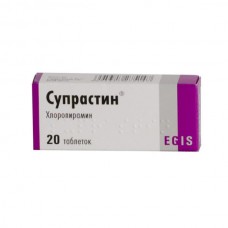Expiration date: 04/2026
Structure and Composition:
Tablets. One tablet contains Chloropyramine hydrochloride 25 mg
excipients: stearic acid, gelatin, sodium carboxymethyl starch (type A), talc, potato starch, lactose monohydrate (116 mg)
in 20 pcs vials. In the paper cartons 1 vial or in blister 10 pcs. In the paper cartons 2 blisters.
Injection. 1 ml contains Chloropyramine hydrochloride 20 mg
Excipients: Water for Injection
in 1 ml ampoules in a cardboard pack of 5 ampoules.
Description pharmaceutical form:
Tablets: white or grayish-white in color, in the form of a disc, chamfered, engraved with «SUPRASTIN» on one side of the tablets and Valium - on another, without or almost odorless.
The solution: clear, colorless, aqueous solution with a weak characteristic odor.
Pharmacokinetics:
When taken orally, it is almost completely absorbed from the gastrointestinal tract. Chloropyramine therapeutic effect develops within 15-30 min after oral administration, reaching a maximum during the first hour after administration and lasts for at least 3-6 hours.
It is well distributed in the body, including the CNS.
Intensively metabolized in the liver. Write mainly kidneys. In children, excretion of the drug faster than adult patients.
Description of the pharmacological actions:
Chloropyramine - chlorinated analogue tripelennamine (piribenzamina) - classic antihistamine belonging to the group of ethylene diamine antihistamines.
Blocker of H1-histamine receptors, has antihistamine and m-anticholinergic effect, has antiemetic effect, moderate spasmolytic and peripheral anticholinergic activity.
Indications:
- hives
- angioneurotic edema (angioedema)
- serum sickness
- seasonal and perennial allergic rhinitis
- conjunctivitis
- contact dermatitis
- itchy skin
- acute and chronic eczema
- atopic dermatitis
- food and drug allergy
- allergic reactions to insect bites.
Contraindications:
- Hypersensitivity to the drug
- acute attack of asthma
- newborns (term and preterm)
- pregnancy
- lactation.
Precautions: angle-closure glaucoma, urinary retention, prostatic hyperplasia, hepatic dysfunction and / or kidney disease, cardiovascular disease, elderly patients.
Application of pregnancy and breastfeeding:
There have been no adequate, with proper control trials of antihistamines in pregnant women. In accordance with this Suprastin taken during pregnancy (especially in I trimester and in the last month) should be only if the potential benefit to the mother outweighs the potential risk to the fetus.
If necessary, use during lactation should decide the issue of the suspension of breastfeeding.
Side effect:
Side effects usually occur rarely, are temporary in nature, disappear after discontinuation of the drug.
CNS: drowsiness, fatigue, dizziness, nervous agitation, tremor, headache, euphoria.
On the part of the digestive tract: abdominal discomfort, dry mouth, nausea, vomiting, diarrhea, constipation, lack of or increase in appetite, pain in the upper abdomen.
Cardio-vascular system: decrease in blood pressure, tachycardia, arrhythmia. Not always was a direct connection between these side effects with the drug intake.
Hematopoietic system: rarely - leukopenia, agranulocytosis.
Other: difficulty in urination, muscle weakness, increased intraocular pressure, photosensitivity.
If any of the above-mentioned effects, stop taking the drug and consult a doctor immediately.
Drug Interactions:
The drug should be used with caution with sedatives, tranquilizers, analgesics, MAO inhibitors, tricyclic antidepressants, atropine and / or sympatholytic, as while the application of the effects of these agents may increase.
Dosage and administration:
Pills
Inside, during a meal, without chewing and drinking plenty of water.
Adults: appoint 1 tab. 3-4 times a day (75-100 mg / day).
Children: ages 1 to 12 months - 1/4 Table. (6.5 mg) 2-3 times a day (pounded to a powder form, along with baby food), from 1 to 6 years - 1/4 Table. 3 times a day or 1/2 Table. 2 times a day, from 6 to 14 years - 1/2 Table. (12.5 mg), 2-3 times a day.
The dose can be gradually increased in the absence of side effects in the patient, but never maximum dose should not exceed 2 mg / kg body weight.
Injection:
V / m, in / in (applies only in acute severe cases under the supervision of a doctor!)
Adults: The recommended daily dose - 1-2 ml (1-2 Amp) / m.
Children aged 1 to 12 months: the recommended initial dose - 0.25 ml (1/4 ampoule) / m from 1 to 6 years - 0.5 ml (1/2 amp) / m from 6 to 14 years - 0.5-1 mL (1 / 2-1 amp.) / m.
The dose may be gently increase depending on patient response and side effects observed. However, the dose should never exceed 2 mg / kg. In severe allergies, treatment should begin with careful slow in / in the injection, and then continue to the / m injection or ingestion of the drug.
Special groups of patients (general recommendations for both forms)
Elderly, debilitated patients: application Suprastin preparation requires special care, because in these patients, antihistamines are more likely to cause side effects (dizziness, drowsiness).
Patients with hepatic impairment: dose reduction may be required in connection with a reduction in the metabolism of the active ingredient of the drug for liver diseases.
Patients with impaired renal function: you may need to change the profile of the drug and dose reduction due to the fact that the active ingredient is mainly excreted through the kidneys ..
Overdose:
Symptoms: hallucinations, anxiety, ataxia, incoordination, athetosis, convulsions. In young children - excitement, anxiety, dry mouth, fixed dilated pupils, flushing, sinus tachycardia, urinary retention, fever, coma.
In adults, fever and facial flushing are observed impermanent, after the commencement of the period followed by convulsions and poslesudorozhnaya depression, coma.
Treatment: In the period up to 12 hours after oral administration is necessary to gastric lavage (please note that the emptying of the stomach prevents the anticholinergic effect of the drug). It is also shown the use of activated carbon.
Necessary to control the parameters of blood pressure and respiration. Symptomatic therapy, resuscitation. A specific antidote is not known.
Special instructions:
Each tablet contains 116 mg of lactose monohydrate. This amount can cause adverse reactions in patients with lactose deficiency or rare metabolic disorders - galactosemia or malabsorption syndrome glucose / galactose. When combined with ototoxic drugs Suprastin may mask the early signs of ototoxicity.
liver and kidney disease may require a change (reduction) of the drug dose, and therefore the patient should inform the physician of the presence of his liver or kidney disease. The drug may enhance the night of reflux esophagitis symptoms. Suprastin can enhance the effect of alcohol on the central nervous system, and therefore the consumption of alcoholic beverages should be avoided while taking the drug Suprastin.
Transport management and mechanisms. The drug, especially in the initial period of treatment, may cause drowsiness, fatigue and dizziness. Therefore, in the initial period, the duration of which is determined individually, prohibited driving vehicles or perform work associated with an increased risk of accidents. After that, the degree of restrictions on the transport driving and work with the mechanisms of the physician must be determined for each patient individually.
The drug should not be used after the date printed on the package.



